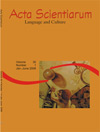<strong>Hybridity and simultaneousness in The Famished Road, by Ben Okri</strong> - DOI: 10.4025/actascilangcult.v30i1.4060
Abstract
This article analyzes The famished road (1991) by Ben Okri, a Nigerian author who lives and publishes his works in England. Its main goal is to demonstrate that it is a hybrid work among different worldviews and narrative forms, characteristic of diverse literary and oral traditions. The analysis is based on concepts of hybridity, cultural translation and vernacular cosmopolitanism by Bhabha (1990 and 2000), as well as on theoretical texts about Yoruba culture and African literature, such as Soyinka (1976), Okpewho (1983), and Quayson (1997), among others. Specificities of African magical realism, a narrative mode that combines distinct strategies and techniques, are also presented with the discussion of authors, such as Cooper (2004), Slemon (1988), and Walter (1993).Downloads
DECLARATION OF ORIGINALITY AND COPYRIGHTS
I Declare that current article is original and has not been submitted for publication, in part or in whole, to any other national or international journal.
The copyrights belong exclusively to the authors. Published content is licensed under Creative Commons Attribution 4.0 (CC BY 4.0) guidelines, which allows sharing (copy and distribution of the material in any medium or format) and adaptation (remix, transform, and build upon the material) for any purpose, even commercially, under the terms of attribution.
Read this link for further information on how to use CC BY 4.0 properly.




















6.png)









